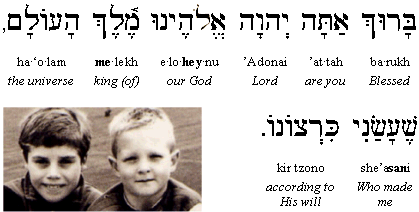|
|
|||||||||||||||||||||||
 |
|||||||||||||||||||||||
|
Learn Hebrew |
|||||||||||||||||||||||
 |
|||||||||||||||||||||||
|
Blessings Book |
|||||||||||||||||||||||
|
|
|
||||||||||||||||||||
|
Introduction |
 |
||||||||||
|
Blessed art Thou, LORD our God, Master of the universe, |
||||||||||
|
Transliterated: |
||||||||||
 |
||||||||||
|
Barukh attah Adonai eloheinu melekh ha-olam, |
||||||||||
|
Hebrew for Christians |
|||||
|
|||||